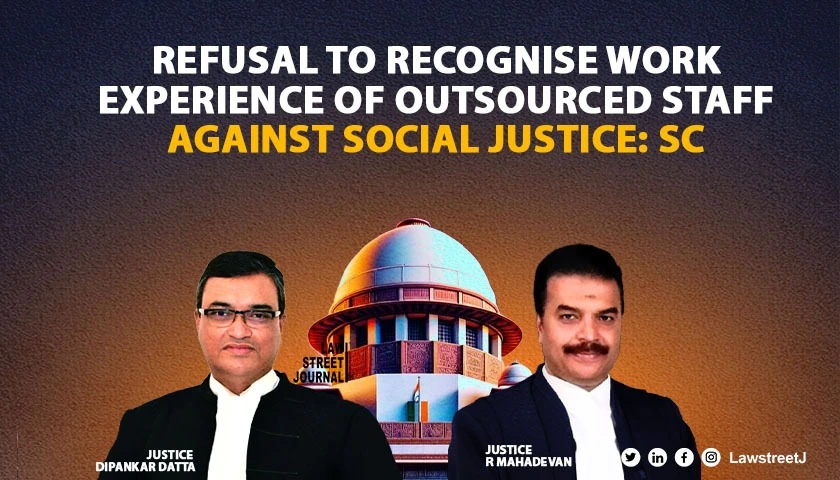NEW DELHI: The Supreme Court has said it would go against principles of equality and social justice, if work experience gained by an outsourced staff in a government department was not recognised.
A bench of Justices Dipankar Datta and R Mahadevan said the State instrumentalities have the duty to promote the welfare of the people by securing and protecting, as effectively as it may, a social order, in which justice – social, economic and political – shall inform all the institutions of national life and endeavour to eliminate inequalities in status, facilities and opportunities.
SC Rules on Outsourced Staff Rights: Work Experience Must Be Recognized
Whenever a conflict arises between the powerful and the powerless, social justice commands the Courts to lean in favour of the weaker and poorer sections where the scales are evenly balanced, the court said.
It also said an underlying current throughout the Constitution is the theme of “social justice”.
Supreme Court Upholds Social Justice in Employment Disputes
The apex court dismissed a plea by Chaudhary Charan Singh Haryana Agricultural University, Hisar against the division bench judgment of the Punjab and Haryana High Court.
The HC had upheld a direction by a single judge bench to consider appointment of respondent, Monika to the post of clerk after awarding her 0.5 marks for the experience as per the advertisement.
In its appeal, the University claimed since the woman candidate was previously engaged under outsourcing policy for the requirements of office work and not appointed on any regular or sanctioned post of clerk, her experience cannot be equated with that of working on a sanctioned post.
In its judgment on November 29, the court rejected the contention, saying refusal to award any mark for experience to a candidate just because she did not work on a sanctioned post and instead was engaged by an outsourcing agency would go against the grain of the constitutional duty of ensuring equality and securing social justice for the deprived.
Using the constitutional mandate prescribed in Articles 14 and 16 read with the preambular promise of securing social justice, the court held that non-grant of mark for experience to the candidate in the recruitment process for group C post was not proper and legal.
"The Preamble, as well as Article 38 of the Constitution, enjoins upon the State instrumentalities the duty to promote the welfare of the people by securing and protecting, as effectively as it may, a social order, in which justice – social, economic and political – shall inform all the institutions of national life and endeavour to eliminate inequalities in status, facilities and opportunities," the court said.
The counsel for the candidate submitted as per the policy, the essential requirement of experience is that the candidate must be working in any department of the Haryana Government, irrespective of the mode of recruitment as government bodies hired manpower in any of the two modes and in both the cases, work is done in the government department.
The court said the true thrust of every selection process ought to be to find out and select suitable candidates, having experience in the related work and fulfilling other criteria, from among eligible candidates and to go ahead with appointing the more meritorious of those found suitable.
"If indeed an individual without having any security of service performs up to the mark and receives commendation from none other than the Head of the Department, who must have closely watched his/her performance, it would occasion a failure of justice to exclude such individual for no better reason than that he/she did not work on a sanctioned post," the bench said.
If indeed such be the requirement, it had to be made explicitly clear in the advertisement without any ambiguity so as not to generate false hopes in the minds of individuals aspiring for public employment, the court pointed out.
"Any other view would be against both the principles of equality and non arbitrariness enshrined in the Constitution as well as principles of natural justice. Tested on the touchstone of Articles 14 and 16, the impugned decision of the University cannot sustain," the bench said.
The court further said the mode of employment is not the primary concern here.
"The state policy, specifying that the individual must have worked on a post equal to or higher than the advertised posts in any of the enumerated departments to secure marks for experience, also reflects the state’s belief that the experience in such departments is directly relevant to the advertised posts. It is not open for the University to now deny marks on the basis of a technical procedural deviation that the experience certificate was not issued by the University, but rather by the service provider," the bench said.
The court said even though the modalities for engagement of two individuals for executing similar nature of work could differ, there can be no quarrel that none can gain experience without being asked to work.
The bench also highlighted the vital difference in working on a sanctioned post as a permanent employee and being employed in the exigencies of administration without having a right to post is that in the former, the appointee enjoys procedural safeguards bringing in a sense of security of service in him while in the latter the individual concerned may not have any such sense of security. But, in case, both perform the work of clerks, the experience gained would not be much at a variance subject, of course, that the job requirement is not too different, the court said.

















